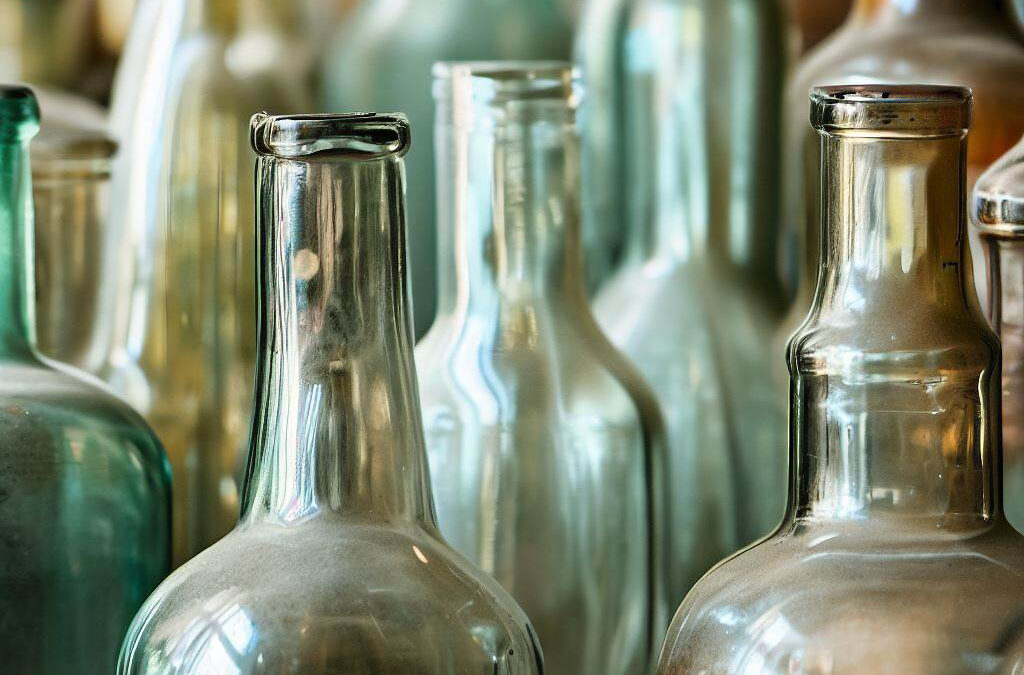
Glass Bottles: A History of Innovation, Quality, and Sustainability
Glass bottles are ubiquitous in our modern life. We use them to store beverages, condiments, cosmetics, medicines, and many other products. But how did glass bottles come to be? What are the advantages of using glass bottles over other materials? And how can we recycle glass bottles to reduce waste and protect the environment? In this blog post, we will explore the fascinating history of glass bottles and their uses.
The origins of glass bottles
The first glass bottles were produced in Mesopotamia around 1500 B.C., and in the Roman Empire around 1 A.D. These ancient glass bottles were made by dipping clay forms into molten glass and then chipping out the clay when the glass cooled. The resulting glass vessels were very thin and fragile, as the fire was not as hot as modern-day furnaces.
The invention of the blowpipe around 1 B.C. revolutionized the production of glass bottles. This device allowed molten glass to be gathered on one end of a metal tube and blown into a hollow shape on the other end. This technique enabled the creation of more varied and complex shapes and sizes of glass bottles.
The use of a mold was another innovation that improved the quality and efficiency of glass bottle making. By blowing glass into a mold, the bottle could have a uniform shape and size, as well as markings or embossing on the surface. The mold also reduced the amount of glass needed for each bottle, making them lighter and cheaper.
The first automatic glass bottle-blowing machine was invented by Michael Owens in 1903 in Ohio, USA. This machine could produce up to 2,500 bottles per hour, compared to 200 per hour by hand. The machine also ensured that each bottle had a consistent shape and thickness, reducing defects and breakage.
Why is it healthy to use glass bottles?
Glass bottles have many advantages over other materials for storing liquids. Some of these advantages are:
– Glass is non-porous and impermeable, meaning that it does not absorb odors, flavors, or chemicals from the contents or the environment. This preserves the quality and freshness of the liquids inside.
– Glass is inert, meaning that it does not react with the contents or the environment. This prevents corrosion, leaching, or contamination of the liquids inside.
– Glass is transparent, meaning that it allows light to pass through. This makes it easy to see the color, clarity, and level of the liquids inside.
– Glass is recyclable, meaning that it can be melted and reshaped into new glass products without losing its quality or purity. This reduces waste and saves energy and resources.
Glass for recycling
Glass recycling is the process of collecting, sorting, cleaning, and melting used glass bottles and jars into new glass products. The process has many benefits for the environment and society, such as:
- Glass recycling conserves natural resources, such as sand, limestone, and soda ash, which are used to make new glass.
- Glass recycling saves energy, as melting recycled glass requires less heat than melting raw materials.
- Glass recycling reduces greenhouse gas emissions, as less energy consumption means less carbon dioxide production.
- Glass recycling reduces landfill space, as glass is one of the most common items thrown away by households.
- Glass recycling creates jobs, as recycling plants employ workers to collect, sort, clean, and process used glass.
Conclusion
Glass bottles have a long and rich history of being used for storing liquids. They have many advantages over other materials in terms of health, quality, and sustainability. They can also be recycled into new glass products without losing their properties or value. By using and recycling glass bottles, we can enjoy their benefits while protecting our environment.
If you liked this article, you might also like The Hidden Costs of Convenience: Single-Use Plastics and Their Environmental Toll

